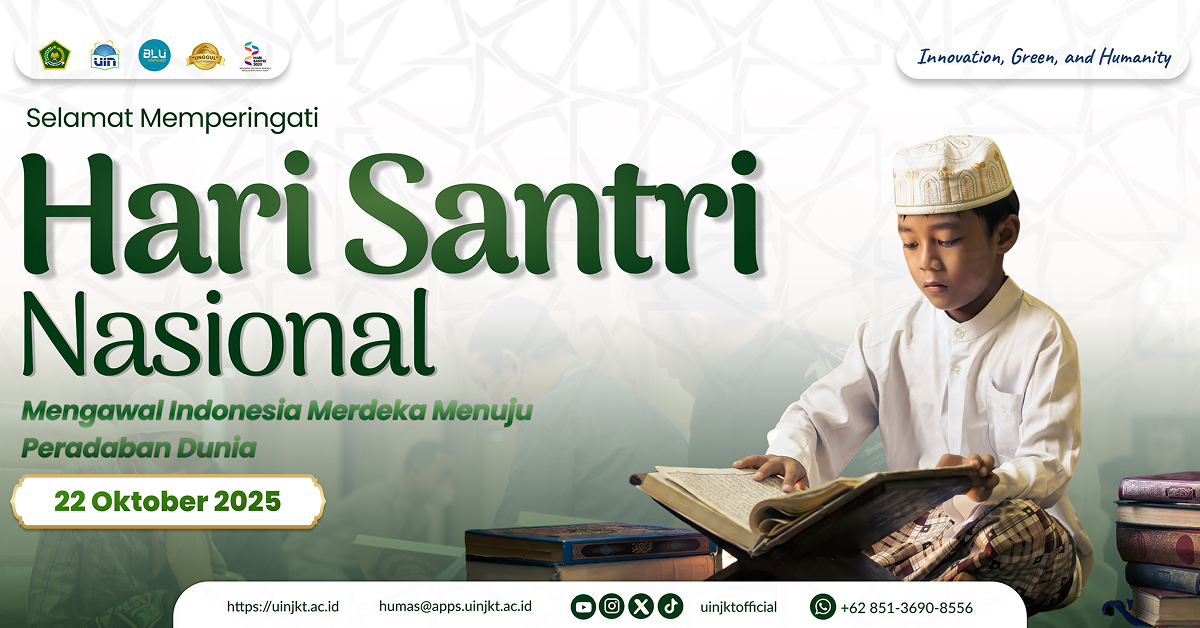National Santri Day: Strengthening Indonesia’s Historical, Cultural, and Religious Identity

Prof. Dr. Murodi Al-Batawi, M.A.
Professor of the History of Islamic Civilization
The establishment of National Santri Day (HSN) through Presidential Decree No. 22 of 2015 stands as a state recognition of the strategic role played by santri (Islamic student) in shaping Indonesia’s national history. The commemoration on October 22 traces back to the historic Jihad Resolution declared by KH. Hasyim Asy’ari in 1945 who successfully encouraged the santri community to rise against colonial forces.
More than an annual ritual, HSN carries profound meaning for the preservation of Indonesia’s religious and cultural identity. As an integral part of the pesantren community, santri are not merely inheritors of Islamic scholarship but also guardians of a moderate and locally rooted Islamic identity. Indonesia as the largest Muslim-majority nation stands in countering radicalism and navigating the challenges of globalization.
This paper explores three major dimensions of National Santri Day: first, as a historical reminder of the santris' contribution; second, as a means of revitalizing pesantren traditions; and third, as a platform for consolidating Indonesia’s Islamic identity.
HSN as a Reinforcement of Historical Narrative
The Jihad Resolution and the Santri Contribution
The Jihad Resolution of October 22, 1945, issued by the Nahdlatul Ulama (NU) under the leadership of KH. Hasyim Asy’ari, marked a pivotal moment in Indonesia’s struggle for independence. He declared thousands of santri to take part in the Battle of Surabaya on November 10, 1945. Thus, HSN reminds that independence was achieved not only through political or military struggle but also through the moral and spiritual commitment of the santri communities.
Reconstructing the National Memory
HSN also plays a vital role in reconstructing Indonesia’s national history, which for decades tended to overlook the religious dimension of the independence movement. Through this commemoration, the state acknowledges the central contribution of Islam and pesantren in the formation of the Indonesia. This recognition helps restore the collective memory of how faith and religious education shaped the foundations of the republic.
HSN as the Revitalization of Pesantren Tradition
Preserving the Intellectual Legacy
HSN serves as an opportunity to highlight the rich intellectual and spiritual heritage preserved in pesantren. The unique learning methods applied in this educational institution represent invaluable components of Indonesia’s Islamic civilization. During HSN commemorations, activities such as bahtsul masail (scholarly discussions), mujahadah (spiritual devotion), and public sermons are held nationwide.
Adapting Tradition to Modernity
Beyond preserving tradition, HSN encourages the adaptation of pesantren heritage to modern contexts. Innovations such as digitalized classical texts, virtual pesantren, and creative forms of da'wa demonstrate how pesantren are evolving. The celebration thus underscores that tradition and modernity are not mutually exclusive but can progress in harmony.
HSN as the Consolidation of Islamic Identity
Promoting Islamic Value
HSN reinforces Indonesia’s distinctive Islamic universal identity (rahmatan lil ‘alamin) serves as a blessing for all His creation. This identity emphasizes moderation, tolerance, and local wisdom, hallmarks of Islam Archipelago. Through HSN, these values are promoted as a cultural and theological alternative to exclusivist or radical interpretations of Islam.
Affirming the Identity of Santri
HSN also strengthens the self-awareness of santri amid the complexities of modern society. Today’s santris are expected not only to master religious sciences but also to contribute to nation-building. Their identity bridges the spiritual-intellectual and socio-practical dimensions.
Challenges and Opportunities Ahead
The Challenge of Modernization
Globalization and modernization bring lifestyle shifts that may erode pesantren values. HSN should therefore serve as a moment to fortify cultural and moral resilience among santris, enabling them to face the moral and ethical challenges of modern life.
Guarding Against Commercialization
There is a legitimate concern that HSN could devolve into mere ceremony without substance. Sustained effort is required to ensure that the commemoration remains a meaningful cultural movement.
Advancing Religious Moderation
At the same time, HSN presents a valuable opportunity to promote religious moderation (wasathiyyah) in Indonesia. By engaging multiple social and institutional actors, HSN can evolve into a collaborative movement that nurtures a peaceful, inclusive, and enlightened expression of Islam.
In essence, HSN is not simply a date on the national calendar; it is a living narrative that celebrates Indonesia’s synthesis of faith, intellect, and patriotism. As the nation continues to navigate the modern world, HSN reminds us that the moral courage, spiritual wisdom, and intellectual legacy of the santri remain indispensable to Indonesia’s future.

